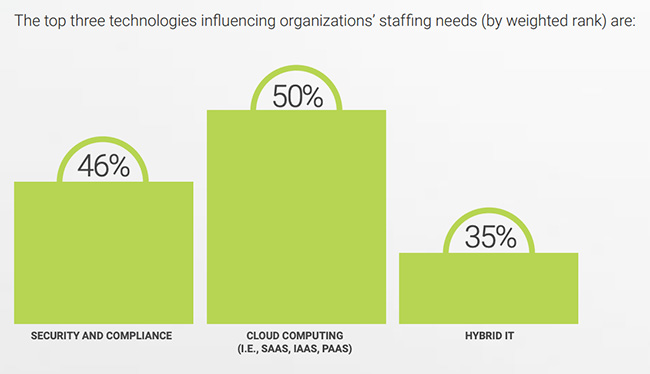Organizations must rethink traditional IT strategy to succeed in the new normal
64% of IT pros are instilled with a new sense of confidence, despite contending with challenges such as reduced budgets, greater decision-making responsibilities, and longer hours caused by their organizations’ response to the pandemic, a SolarWinds survey reveals.

Likewise, 46% feel empowered to bring more ideas to the table while 58% say they now feel more prepared to succeed in similar unexpected situations.
“The success of organizations during this unique time is due in large part to IT pros’ preparedness and inherent ability to adapt and manage through substantial change,” said Rani Johnson, CIO, SolarWinds.
“2020—and the unexpected COVID-19 pandemic—is proof positive IT pros are built for moments like these. What’s particularly encouraging is IT pros’ perception and expectation IT will be included in more business-level decision-making moving forward.
“The dedication of IT pros around the world to ensuring business resiliency and continuity over the past several months serves to elevate and empower the IT community to work alongside business leaders to meet bigger organizational goals.”
IT pros’ upskilling likely to continue into the future
This newfound self-confidence, combined with IT pros’ achievements during this time, will completely transform how IT is viewed by the business in the future. IT may earn a more prominent voice in the C-suite, as 40% of surveyed IT pros believe they will now be involved in more business-level meetings.
Likewise, IT’s role will be up-leveled due to the vast upskilling 26% of IT pros underwent during this experience. With 31% admitting there’s a need to rethink internal processes to better accommodate the rapid change of pace required post-COVID, it’s highly likely a focus on IT pros’ upskilling will continue into the future.
“As always, with new responsibilities comes the need for new skills. While almost half of survey respondents felt they received the training required to adapt to changing IT requirements, nearly one-third experienced the opposite, and are at risk of being left behind as IT teams continue to grapple with how best to support the new normal,” said Johnson.
IT pros gaining an increased sense of confidence
IT pros said they’ve gained an increased sense of confidence in their expanded roles, responsibilities, and ability to adapt to unexpected change in the future, despite contending with more challenging working conditions over the course of the pandemic.
Respondents said longer work hours due to stretched teams (29%), more responsibility (28%) and decision-making requirements (28%), and a general increase in job-related stress (22%) were the leading ways in which day-to-day roles evolved in response to the impact of COVID-19.
Still, 64% agreed this experience—including changes to their day-to-day tasks—has given them a new sense of confidence in managing unprecedented change.
- 46% say the work they accomplished has empowered them to bring new ideas to the table.
- 58% say they now feel more prepared to succeed in any similar unprecedented situations in the future, while another 29% report feeling prepared to manage change but require additional resources, training, and support.
Given the achievements of IT pros during this period, 40% of respondents say they believe IT will be included in more business-level meetings and decision-making moving forward.
Remote workforce support requiring new skills
The implications of COVID-19 accelerated IT pros’ ongoing efforts to upskill in critical competencies, such as systems management, network management, and security policy and compliance.
26% of IT pros said it was necessary to learn new skills to support their organizations’ transitions to a remote workforce.
The top skills IT pros reported as the most important for development:
- Systems management (55%)
- Network management (50%)
- Security policy and compliance (43%)
- Hybrid IT monitoring/management tools and metrics (28%)
47% said they received the training they needed to learn these new skills; however, 25% are still waiting for those training resources to be made available.
The breadth of skills IT pros needed during this time shows how silos are disappearing, as roles start to blur together. In fact, today there is more crossover between traditional roles than there has ever been before and we will continue to see these lines blur until most silos are completely gone.

Technology, process, and team transformations are needed
In the coming months, IT organizations must undergo technology, process, and team transformations to accommodate the new IT requirements associated with extended remote-work scenarios post-pandemic.
71% of respondents felt supporting a remote workforce struck a balance in which certain aspects of day-to-day management were better, while others were more challenging.
- 31% agree there’s a need to rethink internal processes to better accommodate the more rapid pace of change required post-COVID.
- While 18% of respondents reported their toolsets and technologies fell short in addressing the unique challenges of remote workforces, 28% of IT pros flagged a need to consolidate existing solution suites (and their vendors) to simplify management, maintenance, and cost of upkeep.
Although the majority of IT organizations successfully managed the transition to remote work and played a critical role in ensuring business continuity, IT pros expect several trends to shape the future of their respective IT organizations:
- Greater cross-team collaboration (53%)
- More responsibility (46%)
- IT inclusion in more business-level meetings and decision-making (41%)
- Tighter budgets (even post-economic recovery) (26%)
- More opportunity to upskill/attend trainings (25%)